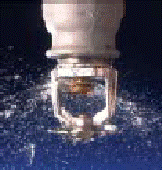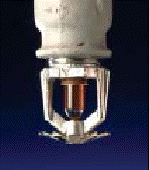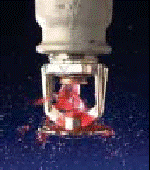
Fire sprinklers are one of the most effective means
to save life and property from fire. Sadly, due to
common misconceptions they are rarely fitted in
commercial and residential buildings.This booklet
sets out the facts about fire sprinklers, so that
readers can see the benefits of this technology.
What are fire sprinklers?
■
A fire sprinkler sprays water evenly onto a
fire below it
■
Only the fire sprinkler above a fire will open
and spray water
■
Fire sprinklers are small and unobtrusive �
you have probably often walked below fire
sprinklers and not seen them.
How do they work?
All the fire sprinklers are connected to a network
of pipes, hanging in the roof or hidden in the ceiling,
permanently filled with water under pressure.
Each fire sprinkler has a water seal held closed by
a thermal element.When there is a fire below, heat
rises and the thermal element gets hot. At a set
temperature it falls away releasing the water seal.
Water is sprayed evenly over the area under the
fire sprinkler, knocking down the flames.
What about reliability?
More than 100 years of experience have shown that
fire sprinklers control the fire in 98% of cases.This is
better than any other fire protection measure.
Can fire sprinklers make a difference?
Fire sprinklers were invented over 100 years
ago. Europe has never recorded a multiple
death in a building protected by fire sprinklers.
Cities in North America that fit fire sprinklers
in all buildings have reduced fire injuries and fire
property losses by over 80%.They have almost
eliminated fire deaths. Fire sprinklers are the
best way to protect you and your property
from fire.
Are they expensive?
To fit fire sprinklers usually costs less than
1% of the cost of the building.
And often it is possible to make savings on
other fire protection measures, so the cost can
be neutral while you gain a big improvement
in fire safety.
What about smoke?
Fire sprinklers react to heat so they do not
operate if you smoke or burn something in
the kitchen. When there is a real fire they
quickly control it so that the fire produces
less smoke.
Will the water cause a lot of damage?
Fire sprinklers attack a fire before it can
grow, so usually only one or two operate
and control the fire. Left to burn the fire
would get much larger and the fire brigade
would need to use much more water to
put it out.










